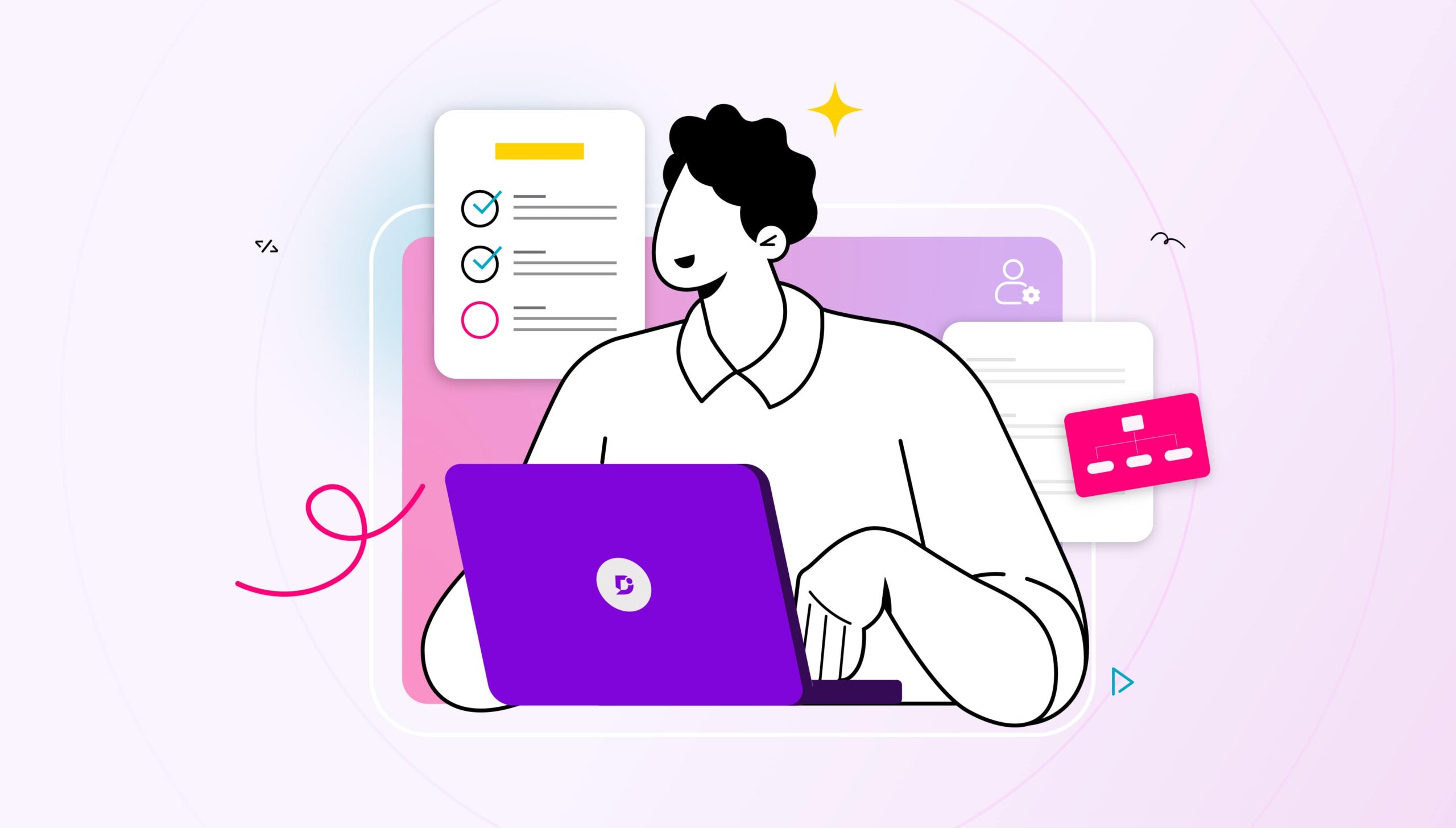Customer churn also referred to as customer attrition, is a business metric that directly represents the number of customers that stop being your customers over a specific period of time.
Customers churning has been an issue since the time when brick and mortar stores were popular. However, with the rise of completely digitized, online businesses, calculating and reducing customer churn has gained even greater importance.
If you owned a brick and mortar store earlier in the days, it was easier to create a special relationship with your clients. After all, customers would walk into your store, you could talk to them, get to know them better, and give them advice tailored to their needs. And because of the physical proximity, i.e: seeing the person face-to-face, it was easier for customers to place trust in you.
It was also harder for them to break that relationship because going to another store that sells the same products could have meant driving to the other side of the city.
Nowadays, walking away from an online store is one of the easiest things a customer can do. It’s literally one click away. Think about it, that takes less than 1 second!
What is Customer Churn?
Customer churn, also known as customer turnover, or defection, is the number or percentage of customers that stop paying for your subscription, product, or service during a certain period of time.
Customer Churn is one of the most important key performance indicators for a company because this metric can be a signal of your customer engagement and overall brand loyalty amidst other company elements which we will talk about further in this article. If you can understand and predict what’s causing your customers to churn, this metric can become a valuable asset for your business.
And if you want your business to stay afloat in the long run, especially if your company is established on top of the SaaS business model, it is essential that you pay attention to customer churn.
Why Reducing Customer Churn Matters
It might be sad to see your customers go, but that is not the only reason why customer attrition matters. The metric has deeper implications for the short-run and long-run performance and longevity of the company.
The cost of retaining a customer is much lower than acquiring a new one.
Existing customers have already had a feel for your product, and since they subscribed for it in the first place, that means they found some value in it. New customers, however, might have never even heard of your product, let alone used it.
This is why lead generation in customer acquisition is so much more time and money-consuming than simply continuing to cater to the same consumer. Because of this, it is important to invest attention into decreasing customer churn.
Customer churn leads to a direct loss of returning revenue (especially in the case of SaaS driven companies).
Your customers, through their sales, are your most important source for funding your ongoing SaaS business. When you lose customers, you lose returning revenue and direct cash inflows to your business.
SaaS companies are susceptible to suffering the pains of customer churn because software services are most of the time subscription-based where the customer pays monthly or annually.
Customer attrition inhibits company growth.
Company growth refers to a certain business increasing in financial value or market share. This can be achieved in many ways, primarily as the number of the company’s user base or site visitors increases.
If consumers stop using the company’s product or service, this impacts the company’s brand reputation and therefore slows down the overall growth of the business.
Customer churn, therefore, gains massive importance for companies in the following industries:
- Subscriber-based service model services (such as most SaaS companies)
- Banking services
- Mobile telecommunication
- Pay TV operators
How to Calculate Consumer Churn
There are two essential ways to measure and calculate your company’s customer churn. It can be expressed either in terms of customers or in terms of revenue
Of course, the most straightforward way to measure customer churn is by calculating the number of customers that have decided to unsubscribe or stop using your product over a specific period of time.
However, assuming you are providing a SaaS-based service or product, thus on a monthly recurring revenue-centric monetization model, you could use the following ways to calculate customer churn rate as percentages.
Subscription Churn Rate
Subscription churn is shown through a percentage. Essentially, it represents the ratio (translated into a percentage) of the total number of customers that chose to stop subscribing to your product or service over the total number of subscribers at the beginning of the period.

Subscription churn is logically tied to overall customer satisfaction about a certain product or service and is an important metric to evaluate the health of your company.
Revenue Churn Rate
Revenue churn is also demonstrated through a percentage but is a more accurate indicator of the revenue loss that comes from consumer churn. Since you can use both gross and net revenue to evaluate your business’ income, we have presented below both formulas for your convenience.

The difference between gross revenue churn and net revenue churn is that the latter also takes into account upsells during that period.
The very well-known company, Netflix, maintains very cautious of their churn rate. The online streaming service aims to keep its customer churn rate as low as possible by keeping their viewers engaged and watching as much as possible.
Causes of Customer Churn
Before we discuss actionable tips and strategies, we should focus on the root causes of customer churn. Here are four:
Poor Customer Service
In today’s highly competitive business environment, customers demand instant and exceptional customer service. Many companies forget to regard customer support as one of the most important aspects of their augmented product.
Customer service is a large contributor to user satisfaction and is regarded as the main reason companies lose their customers.78 percent of millennial customers have moved their business somewhere else after one single poor customer service experience. The emphasis on customer service creates large implications for your company.
This is why poor or mediocre customer service leads to consumers abandoning the product or service. In some cases, they will also leave bad reviews before or after they depart, which could also affect the actions of your other customers or prospective customers.
Poor Onboarding Process
There are two key moments in the onboarding process. The first one is when your consumer signs up for the product or service and the second one is when the consumer achieves its first success with the product or service.
Most of the customer churn happens between these two key moments, i.e. when the consumer has signed up for the product or service but fails to see the value or advantage within a certain period of time.
This often happens due to the difficulty of the customer onboarding process, which is where consumers first start having a direct relationship with your brand.
Lack of Ongoing Customer Success
Customer success has to do with the continuous efforts of a company to deliver value to their customers. Each product or service should add value to a customer’s life, which is the reason why he/she is purchasing or subscribing to it.
If your company fails to deliver on the promises that come with purchasing a product or service, the customer lifetime value will drop down. Additionally, it will also contribute to a decrease in overall customer satisfaction, which will ultimately lead to customer churn.
If you want to learn more on how to achieve customer success, check out our Ultimate Guide to SaaS Customer Success Best Practices
Lack of Brand Loyalty
When consumers develop brand loyalty towards your company, they are much more likely to spend more money or refer their friends to do the same. Referred customers cost far less and require less effort to acquire than regular customers.
Brand loyalty is usually only instilled after the second key moment, i.e. after the customer has reached his/her first success with the product or service. Before this point, the potential costs for switching to another product or service provider are very low, thus making it easier for them to churn. This again emphasizes the importance of good onboarding and ongoing customer support.
9 Strategies to Reduce Customer Churn
Now that you know all about the causes of customer churn and how to anticipate it, you can consider different strategic options when it comes to reducing it. We list nine of them that you can start using today.
1.Proactive measures to identify customers at risk
Here are some things to look out for to anticipate potential customer churns:
- Cancellation of automatic subscription renewals.
- Negative interaction or experience with members of customer service.
- Shrinking of web-based activity.
- A decrease in mobile-based activity, including mobile payments.
- Falling of social media shares and overall social media activity.
- Bad reviews in social media platforms like Facebook, Twitter, Quora, Reddit etc.
By keeping an open eye and an open mind towards these patterns, you can anticipate individual or groups of customers from churning and take appropriate measures to address them.
2. Analyze Why Customers Leave
To get a better sense of why your customers are leaving, you can try getting that information from the source: simply by asking them.
You can directly call your customers for feedback and ask them what their motivation for leaving was, in order to analyze the reasons for customer churn. You can also survey them at the point of churn or send them a follow-up email.
Understanding and analyzing customer churn factors is the first step of the diagnostics of the problem. This will then be the basis for constructing a proper strategy with solutions that address the churn factors for your business.
3. Target the “Right” Customers
Identifying the correct target audience for your business is crucial to its success and customer satisfaction. If the needs of your consumer do not match the needs your product is trying to solve, you will inevitably have a high customer churn rate.
Avoid using words like “cheap” or “free forever ” when offering free trials or subscriptions since the attracted customers are likely to leave quickly (or right after the trial period expires).
Customer churn rate will be especially high when you use such keywords in marketing communications because they might convert customers that are not purchasing the product with the right intent, and who do not appreciate the value that product offers.
4. Build Lasting Relationships with Customers
Aside from striving to have a superior product and offering, there are some small things you can do to make sure your customers stay loyal. As the old saying goes “The devil is in the details”.
Look out for the ways which can help you create a personal relationship with your customers.
5. Improve Customer Service
As we have already established, customer service is a dealbreaker in terms of both customer loyalty and low customer churn rates. Average just doesn’t cut it anymore.
Here are just some of the best customer support practices for delivering superior service:
- Make sure to always have customer service representatives available and ready to communicate with customers.
- Be as helpful as possible and don’t try to “dodge” their problems or complaints.
- Train your customer service representatives in communication and make sure they have a good understanding of the company’s knowledge base content so that they can direct users to the right destination for their specific problem.
- Nowadays it’s more efficient to also have a self-service knowledge base for users to read on their own. This way they can find information almost instantly, without having to contact customer support.
Interested in Document360 Knowledge base? Schedule a demo with one of our experts
Book A Demo
6. Engage with Your Customers on a Daily Basis
People love to feel special. This is why continuous engagement with your customer base is essential to establishing a relationship between your business and them.
You should aim to make your product a part of their daily life. Use social media, your company’s website, daily/weekly email or newsletter, or even face to face communication to stay in touch with your customers.
7. Implement Customer Retention Activities
Attracting customers comes with an expensive price tag, which makes many customer relationships unprofitable during the early stages. Only in later on, when their total customer lifetime value supersedes the cost of acquiring their business and keeping them loyal, do relationships generate big returns. Keeping them loyal is the key part of that equation.
Always go the extra mile for your customer by offering them:
- different pricing deals
- seasonal discounts
- coupons
- referral programs.
The most successful case of referral programs in recent business news is Dropbox. The company grew 3900% in ten years, going from 100K registered users to 500 million just because of their smart and easy referral program.
Customers look for companies that make them feel appreciated and this way you can make sure you are increasing your brand loyalty and decreasing your customer churn in the process.
8. Educate your customer
Offering your customer an amazing knowledge base covering issues and components of your products or services is a great way of educating your customers.
You can also use elements of the knowledge base to educate your customer by:
- Hosting different seminars or webinars
- Offering tutorials
- Presenting different guides and how-tos on your website.
- Having a Q&A or FAQ section and/or utilize community forums to increase not only customer engagement but also their overall knowledge base.
These methods, when used appropriately, allow your customer to get the most out of the product or service they are utilizing and paying for.
Schedule a demo with one of our experts to take a deeper dive into Document360
Book A Demo
9. Create obstacles for customer churn
Another straightforward way of decreasing customer churn is by putting up some “barriers” to prevent it from happening. Although this does not necessarily end up creating added value for your business, it’s an effective way of producing results.
You can make it more difficult for your customers to churn using three different ways
- Value-added services.
- Contractual binding periods. By locking in your customers in your contract, the customer churn rate will decrease. This means, for example, providing a discount for yearly subscriptions instead of monthly ones to make sure the customer will not switch or ditch the product or service.
- Loyalty programs. Loyalty programs are rewards programs for customers which incentivize spending more money and purchasing more, usually through loyalty cards or badges.
Conclusion
As we covered throughout the post, customer churn – the rate at which your customers are unsubscribing or abandoning your product or services – is one of the key performance indicators of any company.
One of the primary causes of customer dissatisfaction, which ultimately leads to churn, is an unpleasant account with customer service representatives. This is why it is important that your company puts in place exceptional customer service at all times and constantly strives to educate its employees and customers.
The utilization of a knowledge base is essential in achieving this goal, whether it is for your customer service team to use when helping customers or for your customers to refer to independently.
Creating and maintaining a knowledge base, however, can turn out to consume a lot of time and resource. That’s why several companies have started utilizing knowledge base software to help them maintain a top-notch knowledge base.
The best example of knowledge base software which can help you massively increase your customer’s satisfaction is Document360.
Document360 is knowledge base software that helps your team create, collaborate, and publish a self-service knowledge base for your software with ease. If you are looking for an easy way to keep your customers happy and prevent them from churning, you can give Document360 a try. It’s free for 14 days, with no credit card required.
Did you find this article and the different strategies for reducing customer churn helpful? Is there anything you think we didn’t include on customer churn, its causes, computations, and ways to deal with it?




 –
– 

